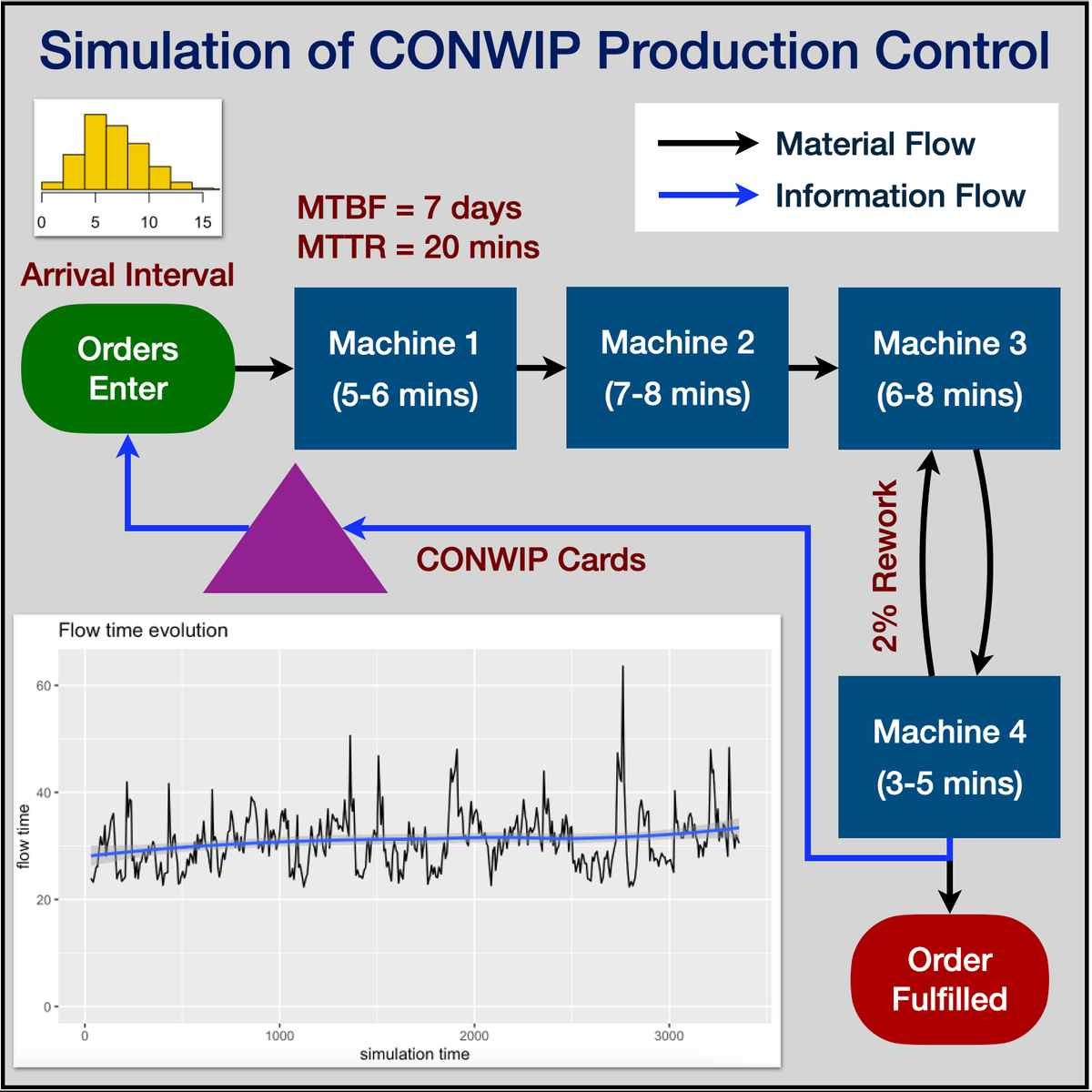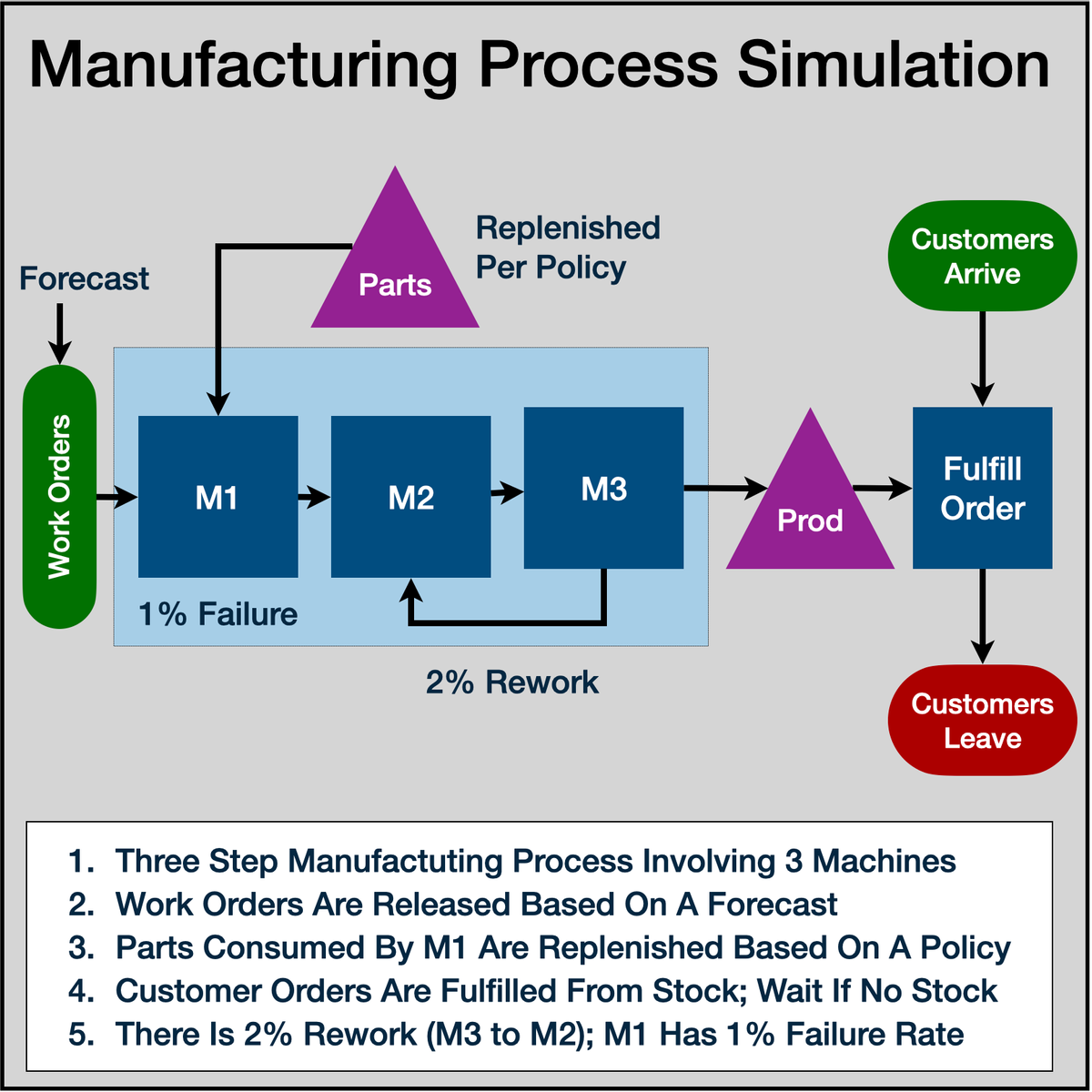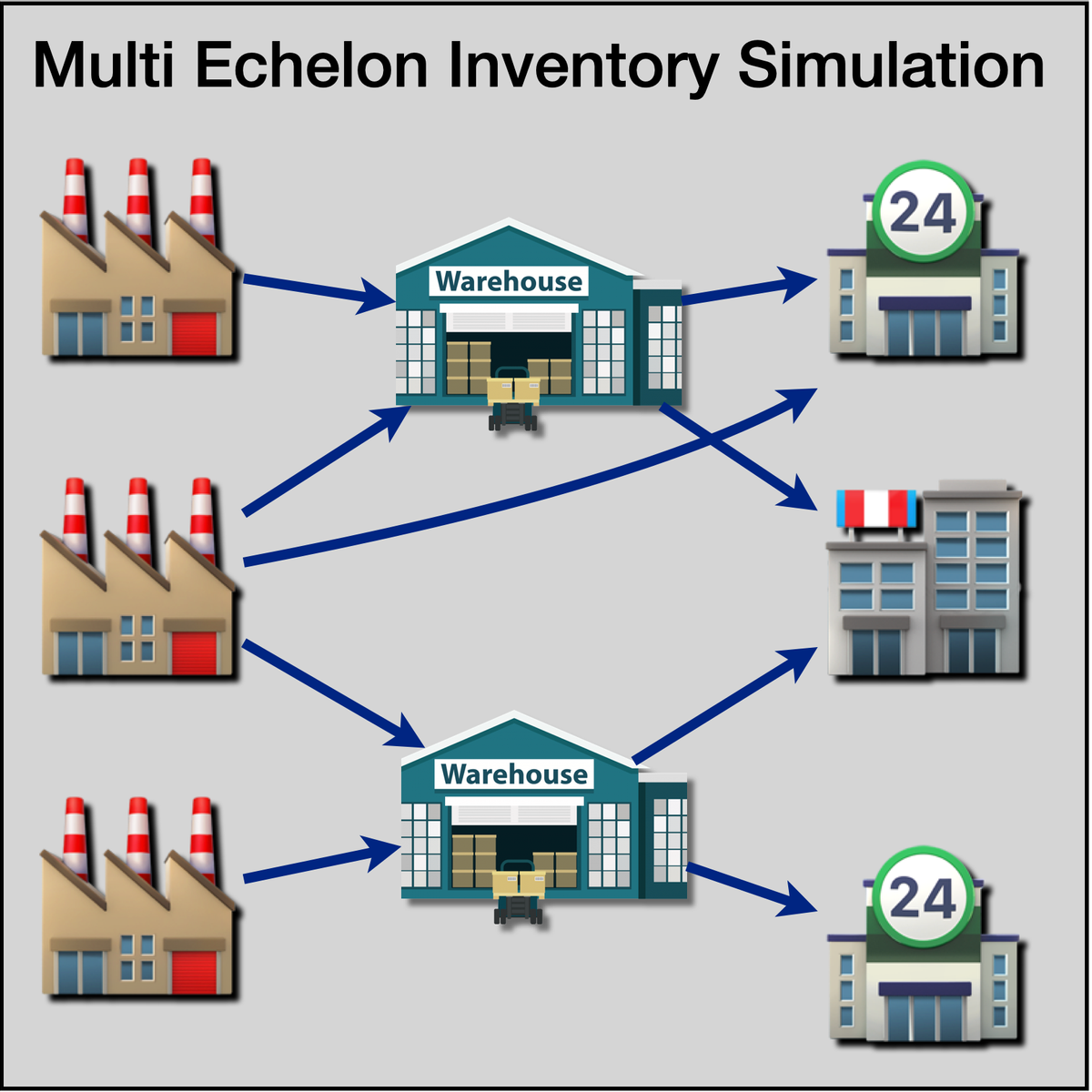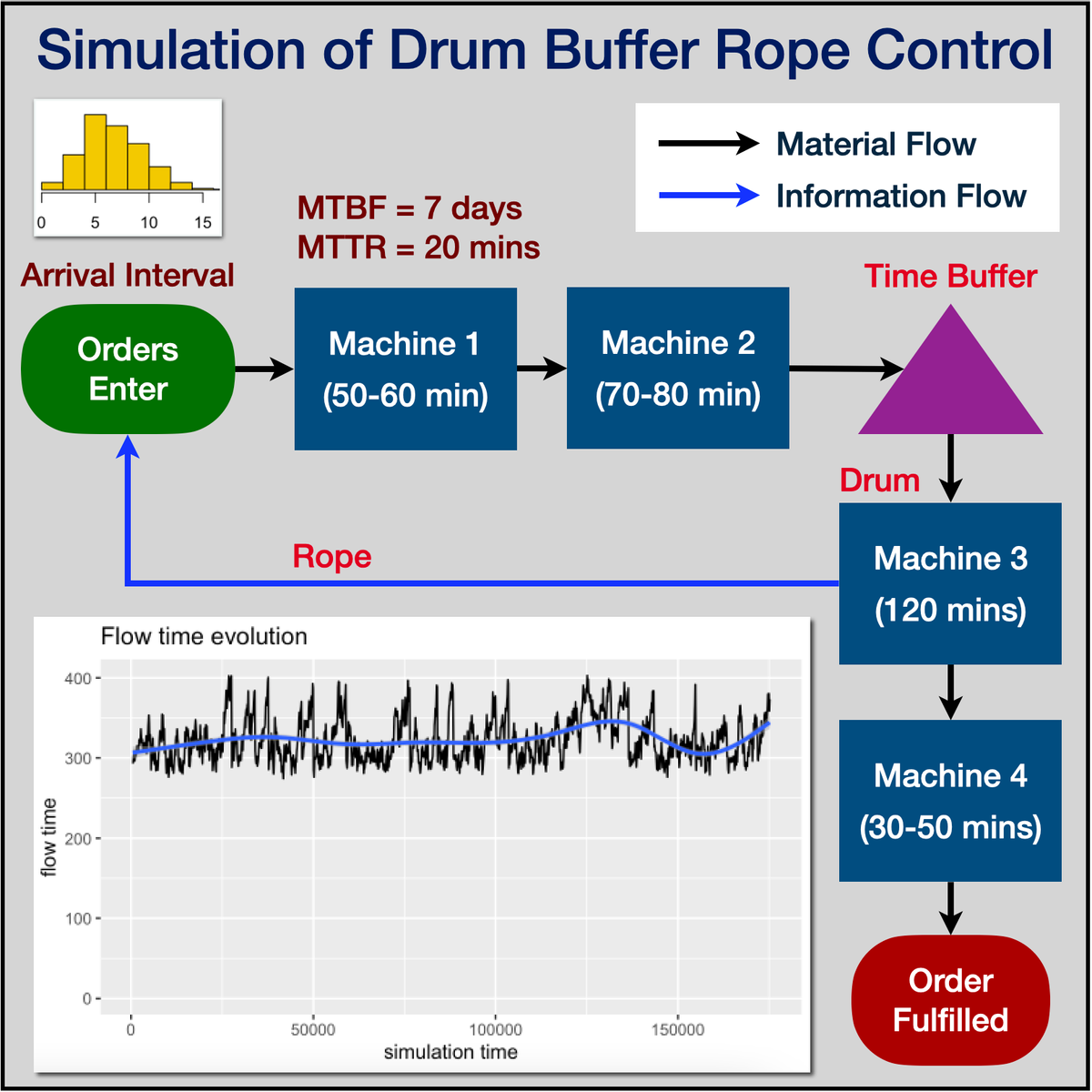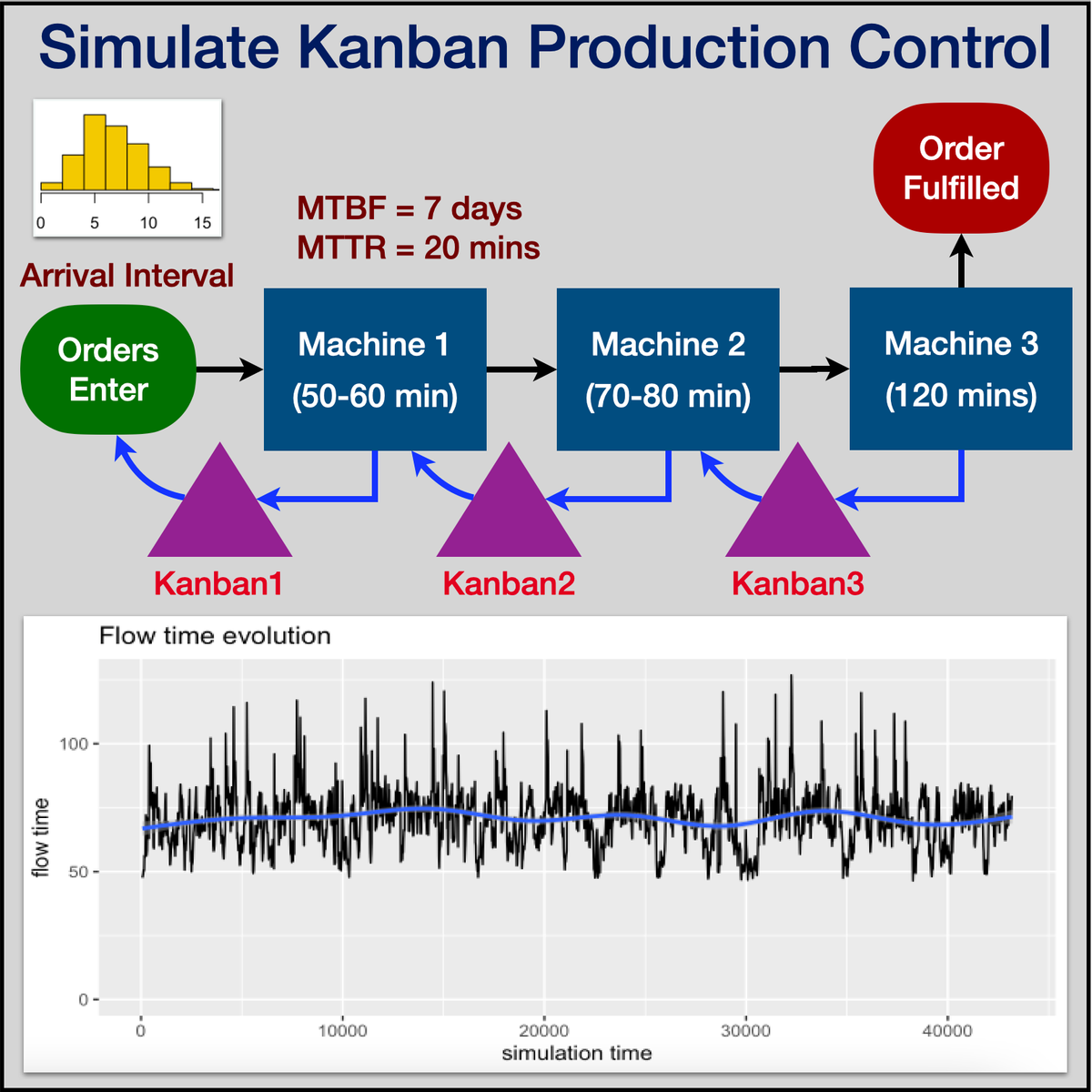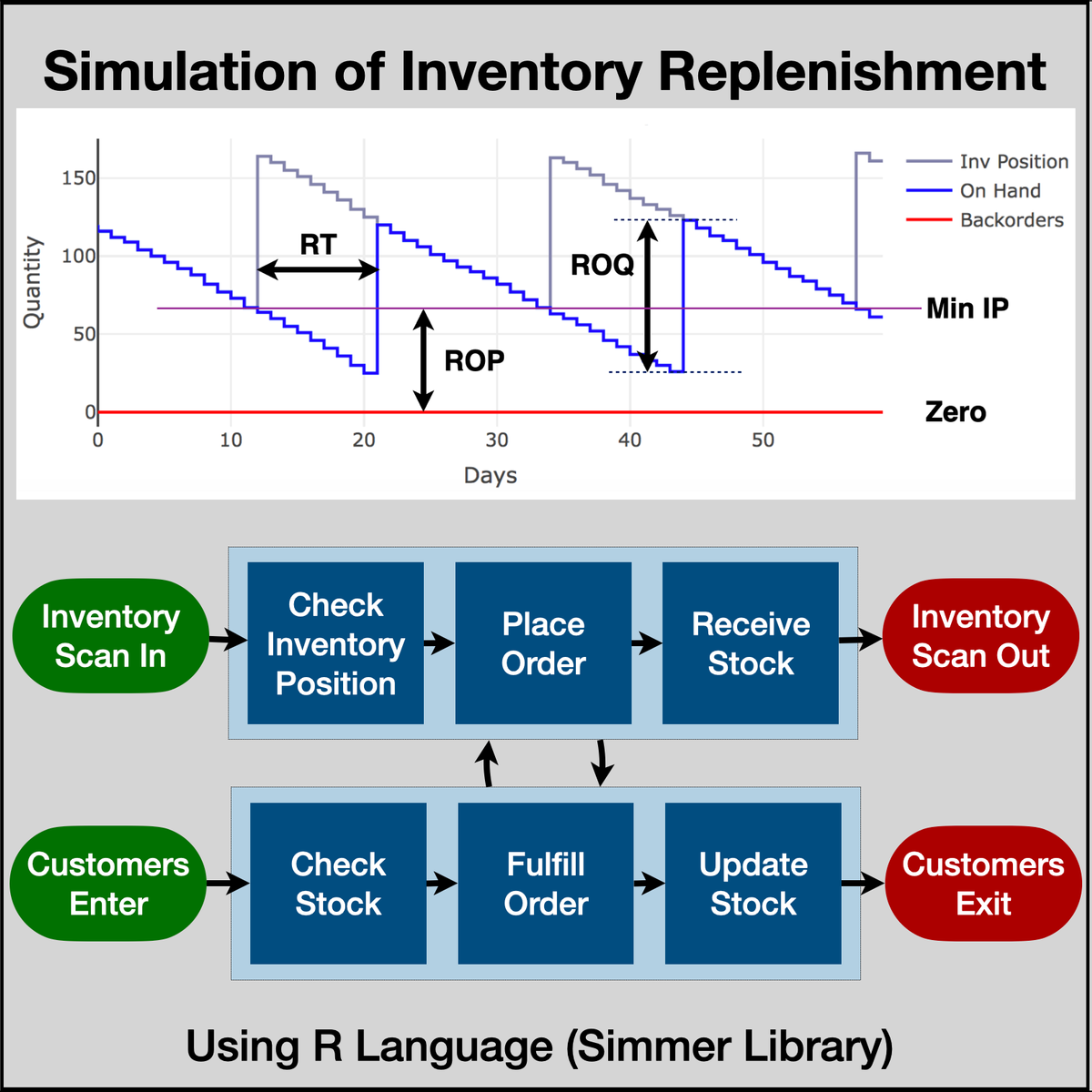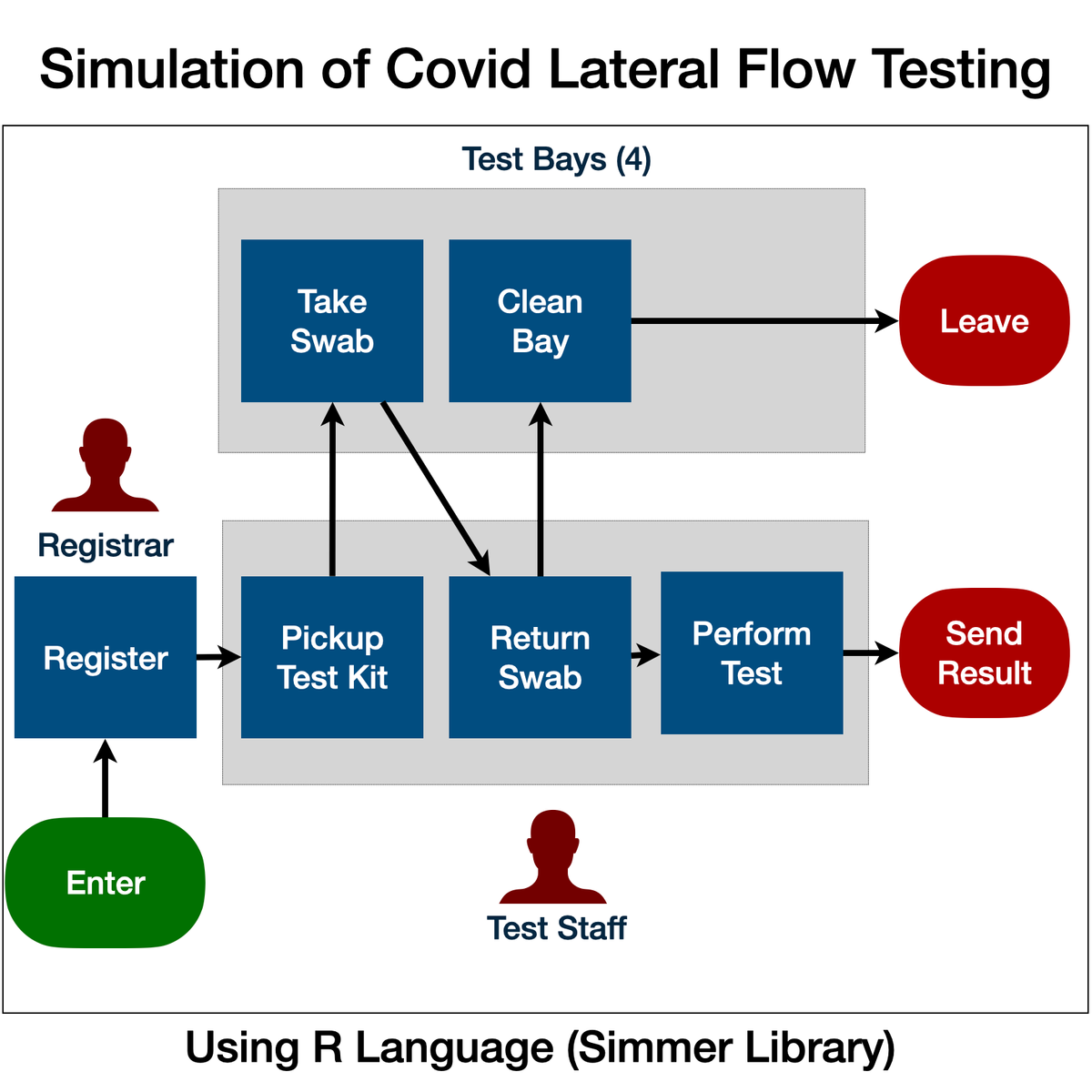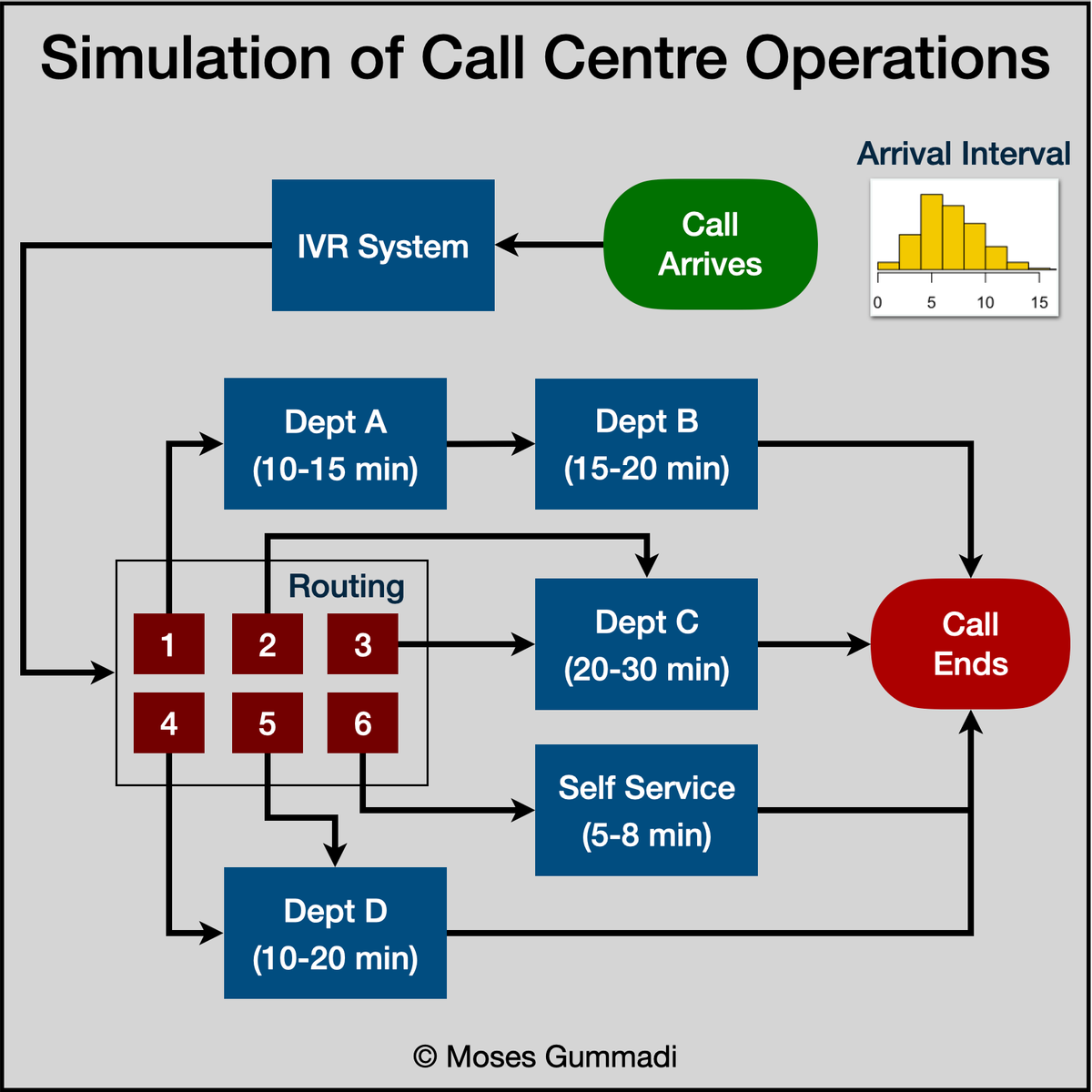Discrete Event Simulation
Comprehensive Guide to Discrete Event Simulation
Discrete Event Simulation (DES) is a powerful method for modeling the operation of a system as a sequence of distinct events occurring over time. Imagine trying to understand the complex dance of an airport during peak hours – passengers arriving, bags being checked, security lines forming, and planes taking off. DES allows us to create a virtual replica of such systems, where each of these activities is an "event" that changes the state of the airport. By observing these changes, we can gain insights into how the system functions, identify potential bottlenecks, and test the impact of proposed improvements, all without disrupting the real-world operation.
Working with Discrete Event Simulation can be intellectually engaging and rewarding. It offers the opportunity to dissect intricate real-world problems, transforming them into logical models that can be experimented with in a risk-free digital environment. The ability to forecast the outcomes of different scenarios and provide data-driven recommendations for optimization can be immensely satisfying. Furthermore, DES is a versatile tool applicable across a wide array of industries, from optimizing manufacturing lines and improving patient flow in hospitals to assessing financial risk and streamlining logistics. This versatility means that skills in DES can open doors to diverse and impactful career paths.
Introduction to Discrete Event Simulation
This section will lay the groundwork for understanding Discrete Event Simulation, defining its core principles and exploring its origins. We will also touch upon some of the key industries where DES plays a crucial role and introduce some fundamental terminology that will be used throughout this article.
Definition and Core Principles
At its heart, Discrete Event Simulation (DES) is a modeling technique used to analyze systems where changes occur at specific, distinct points in time. Think of it like a play, where the plot progresses through a series of scenes (events), and between these scenes, the actors (system components) are essentially in a fixed state, even if time is passing. The simulation "jumps" from one event to the next, only concerning itself with these moments of change. This contrasts with continuous simulation, where the system's state is monitored and updated constantly, like tracking the smooth flow of water in a pipe.
The core idea is to represent a system as a collection of interacting components and to simulate how distinct events cause these components, and thus the overall system, to change over time. By running these simulations, often many times with slight variations, analysts can understand system behavior, identify inefficiencies, and test potential improvements. The ability to experiment with "what-if" scenarios in a controlled, virtual environment is a key strength of DES.
These courses offer a solid introduction to the fundamental concepts of Discrete Event Simulation and its applications.
Historical Origins and Evolution
The roots of Discrete Event Simulation can be traced back to the mid-20th century, closely intertwined with the advent of computers. Early pioneers in operations research and computer science recognized the potential of these new machines to model complex systems. The 1950s and 1960s are often considered the "pioneering period," where foundational concepts were laid, and the first simulation programming languages began to emerge. Early applications were often focused on manufacturing and queuing problems.
Over the decades, DES has undergone significant evolution. The "innovation" and "revolution" periods saw the development of more sophisticated software tools, graphical user interfaces, and the integration of statistical analysis capabilities. The increasing power of computers allowed for more detailed and complex models. More recently, the "evolution" period has been characterized by trends such as integration with other technologies like Artificial Intelligence (AI) and the rise of cloud-based simulation platforms. Individuals like Keith Douglas Tocher, who developed the General Simulation Program (GSP), and B. P. Zeigler, known for the Discrete Event System Specification (DEVS) formalism, made significant contributions to the field.
For those interested in the theoretical underpinnings and historical context, these books offer valuable insights.
Key Industries and Applications
Discrete Event Simulation is a versatile tool utilized across a multitude of industries to solve complex problems and improve operational efficiency. In manufacturing, DES is widely used to optimize production lines, manage inventory, identify bottlenecks, and test new plant layouts before implementation. For example, a company might simulate different machine configurations to see which one yields the highest throughput or the lowest work-in-progress inventory.
Healthcare is another significant area where DES makes a substantial impact. Hospitals and clinics use simulation to improve patient flow, reduce waiting times in emergency rooms or outpatient departments, optimize staff scheduling, and plan for capacity needs. Imagine simulating a busy emergency department to test different triage protocols or staffing levels to see how they affect patient wait times and resource utilization.
The logistics and supply chain sector heavily relies on DES to model and optimize transportation networks, warehouse operations, and inventory management strategies. Companies can simulate the movement of goods through their supply chains to identify potential disruptions, test different routing algorithms, or determine optimal inventory levels at various locations. Other notable applications include call centers (optimizing agent schedules and call routing), financial services (assessing risk), and even computer network optimization (evaluating network capacity and identifying bottlenecks).
Basic Terminology (ELI5: Explain Like I'm 5)
Imagine you're playing with toy cars and a toy garage. In the world of Discrete Event Simulation, we have special names for the things in your game.
The System is like your whole play area – the garage, the roads, and all your cars. It's everything we're interested in looking at.
The Entities are the "things" that move through your system. In your game, the toy cars are the entities. In a real-world simulation, entities could be customers in a bank, parts on an assembly line, or patients in a hospital.
An Event is something that happens at a specific moment that changes something in your system. For example, a car arriving at the garage is an event. A car leaving the garage is another event. A car getting "fixed" in the garage (if you pretend one is a mechanic!) is also an event.
Attributes are like the special features of your entities. One car might be red (color attribute), another might be fast (speed attribute). In a simulation, an attribute could be a customer's arrival time or the type of service a patient needs.
A Queue is just a waiting line. If too many cars arrive at your toy garage at once and only one can go in at a time, the other cars have to wait in a line. That line is a queue. People waiting at a checkout counter or calls waiting for a customer service agent are examples of queues.
Resources are things that entities need to use to get something done. In your toy garage, maybe there's only one "parking spot" or one "mechanic" (another toy figure). That spot or mechanic is a resource. In a factory, a machine is a resource. In a hospital, a doctor or a bed is a resource.
The State of the system is a snapshot of what's happening at any given moment. For example, the state could be: "three cars waiting in the queue, one car in the garage, and the mechanic is busy." When an event happens, the state of the system changes.
The Simulation Clock is like a special clock that doesn't tick every second. Instead, it jumps from the time of one event to the time of the next event. This is because in DES, we're mostly interested in what happens *at* the events, not necessarily all the tiny moments in between.
Core Components of Discrete Event Simulation Models
To build a Discrete Event Simulation model, several key components must be defined and integrated. These components work together to replicate the behavior of a real-world system over time. Understanding these elements is crucial for anyone looking to delve deeper into creating or interpreting DES models.
Entities, Attributes, and Resources
Entities are the fundamental objects that flow through a DES model, representing the items or individuals being processed or served. Examples include customers in a bank, parts in a manufacturing line, patients in a hospital, or data packets in a communication network. Entities are dynamic; they are created, move through the system, and eventually depart.
Each entity can possess attributes, which are characteristics or properties that distinguish one entity from another or store information about its state. For instance, a customer entity might have attributes like arrival time, service priority, or the type of transaction required. A part entity in a factory might have attributes such as its current processing stage or defect status. These attributes can change as the entity progresses through the simulation.
Resources are the elements within the system that provide service to entities or are required for entities to complete an activity. Resources are typically limited in capacity. Examples include bank tellers, machines on an assembly line, hospital beds, or a runway at an airport. Entities often compete for these resources, leading to the formation of queues if a resource is busy when an entity requires it. The availability and utilization of resources are key performance metrics often analyzed in DES studies.
To get hands-on experience with defining and manipulating these core components, these courses offer practical exercises.
Event Scheduling and Time Progression
A cornerstone of Discrete Event Simulation is the concept of an event list (also called a future events list or FEL) and the mechanism for advancing simulation time. An event is an instantaneous occurrence that can change the state of the system. The simulation maintains a clock to keep track of the current simulated time.
The event list is a data structure, often a priority queue, that stores all scheduled future events, ordered by their time of occurrence. When the simulation starts, initial events are placed on this list. The simulation proceeds by repeatedly taking the event with the earliest time from the event list, advancing the simulation clock to that event's time, and then executing the logic associated with that event. This event execution may, in turn, schedule new future events, which are added to the event list.
This method of advancing time is known as next-event time progression (or event scheduling approach). The simulation clock "jumps" from one event time to the next, skipping the periods in between where no state changes occur. This is highly efficient for systems where activity is sparse. An alternative, though less common in pure DES, is fixed-increment time progression, where the clock advances by a small, fixed amount, and the system is checked for any events that occurred during that interval. Most DES software employs the next-event approach due to its efficiency.
Statistical Distributions and Randomness
Real-world systems are often characterized by variability and uncertainty. Customer arrival rates fluctuate, machine processing times vary, and equipment failures occur unpredictably. To accurately model such systems, DES incorporates randomness through the use of statistical probability distributions.
Instead of using fixed values for things like inter-arrival times (the time between consecutive entity arrivals) or service times (the time an entity spends at a resource), these are often sampled from appropriate probability distributions (e.g., exponential, normal, uniform, Poisson). For example, the time it takes for a bank teller to serve a customer might be modeled using a normal distribution with a specific mean and standard deviation, reflecting that most service times cluster around the average, but some are shorter and some are longer. The choice of distribution is critical and should be based on real-world data analysis or informed assumptions about the process being modeled.
Random number generators (specifically, pseudo-random number generators) are used to produce sequences of numbers that, when transformed, provide samples from these desired statistical distributions. The use of pseudo-random numbers allows simulations to be reproducible if the same initial "seed" for the generator is used, which is important for debugging and comparing different model scenarios under the same random conditions. Properly modeling randomness is essential for capturing the dynamic behavior of systems and for generating realistic performance measures.
These books delve into the mathematical foundations essential for understanding randomness and distributions in simulation.
Model Validation and Verification
Building a DES model is only part of the process; ensuring its credibility is equally, if not more, important. This involves two key activities: verification and validation.
Verification is the process of ensuring that the simulation model is implemented correctly as per its conceptual design and specifications. Essentially, it answers the question: "Are we building the model right?" This involves debugging the simulation code, checking the logic of event routines, ensuring that data is being processed correctly, and confirming that the underlying algorithms are functioning as intended. Techniques for verification include code walk-throughs, running test cases with known outputs, and using animation to visually inspect the model's behavior under simple conditions.
Validation, on the other hand, is the process of determining whether the simulation model is an accurate representation of the actual system being studied, within the intended domain of application. It answers the question: "Are we building the right model?" Validation involves comparing the model's output to data from the real system. This might include comparing average queue lengths, resource utilizations, or throughputs. If historical data is available, the model can be run with historical inputs and its outputs compared to historical outputs. Subject matter experts who are familiar with the real system should also review the model's assumptions, logic, and behavior to assess its face validity. Achieving a high degree of validation can be challenging, especially for complex systems or when real-world data is limited, but it is crucial for ensuring that the decisions based on the simulation results are sound.
Discrete Event Simulation in Industry Applications
Discrete Event Simulation (DES) provides significant value across various industries by enabling businesses to analyze, predict, and optimize their operations. Its ability to model complex, dynamic systems makes it an indispensable tool for decision-making, particularly when dealing with variability and resource constraints. The return on investment (ROI) often comes from improved efficiency, reduced costs, better resource utilization, and enhanced customer satisfaction.
Supply Chain Optimization Case Studies
Supply chains are inherently complex, involving multiple stakeholders, processes, and uncertainties. DES is extensively used to model and optimize various aspects of supply chain operations. For instance, companies can use DES to analyze the impact of different inventory policies (e.g., reorder points, safety stock levels) on overall costs and service levels. By simulating demand fluctuations and lead time variabilities, businesses can identify optimal inventory strategies that balance holding costs against the risk of stockouts.
Another common application is in logistics network design and optimization. A company might use DES to evaluate the performance of different distribution center locations, transportation modes, or routing strategies. For example, a simulation could model the flow of goods from suppliers to manufacturing plants, then to distribution centers, and finally to customers, considering factors like transportation times, costs, and capacity constraints. Such models help in identifying bottlenecks, reducing transportation expenses, and improving delivery times. Case studies often show significant cost savings and efficiency gains achieved by using DES to reconfigure supply networks or improve operational policies. For instance, a manufacturing firm might use simulation to assess the impact of supplier disruptions and develop more resilient sourcing strategies.
These courses provide practical insights into applying simulation for logistics and production control, relevant to supply chain challenges.
Healthcare System Capacity Modeling
Healthcare systems face constant pressure to deliver high-quality care efficiently, often with limited resources and fluctuating patient demand. DES is a powerful tool for modeling healthcare operations and planning capacity. Hospitals and clinics use simulation to analyze patient flow through different departments, such as emergency rooms, outpatient clinics, or surgical suites. By modeling patient arrivals, service times for various procedures, and resource availability (e.g., doctors, nurses, beds, equipment), healthcare providers can identify bottlenecks, predict waiting times, and evaluate the impact of process changes.
For example, a hospital might use DES to determine the optimal number of beds in an intensive care unit (ICU) based on projected patient admissions and length of stay distributions. Simulation can also help in designing more efficient staff schedules, improving the layout of facilities, or evaluating the benefits of new technologies or treatment protocols. During public health crises, such as a pandemic, DES has been used to model the spread of disease and assess the capacity of healthcare systems to handle surges in patient volume, as demonstrated by simulations of COVID-19 testing processes. The insights gained from these models help administrators make informed decisions about resource allocation and operational improvements to enhance patient care and reduce costs.
This course specifically addresses simulation in a healthcare context.
Financial Risk Assessment Scenarios
The financial industry employs DES, often in conjunction with Monte Carlo methods, to assess and manage various types of risk. For instance, investment banks and portfolio managers can use simulation to model the performance of investment portfolios under different market conditions. By simulating factors like stock price movements, interest rate changes, and credit default probabilities, they can estimate potential losses and evaluate the effectiveness of hedging strategies.
Insurance companies utilize DES to model claims processes and assess their capital adequacy. By simulating the frequency and severity of claims for different lines of business (e.g., auto, home, life insurance), insurers can project future liabilities and determine appropriate premium levels. Simulation can also be used to stress-test an insurer's financial position against catastrophic events.
In credit risk management, lenders can use DES to model the probability of loan defaults and estimate potential credit losses. By simulating borrower behavior and economic factors, financial institutions can refine their lending policies and set appropriate loan loss reserves. The ability to model complex interactions and uncertainties makes DES a valuable tool for making more informed risk management decisions in the financial sector.
Comparison with Continuous Simulation Methods
Discrete Event Simulation (DES) and Continuous Simulation (CS) are two primary paradigms in the world of modeling and simulation, each suited to different types of systems and problems. The fundamental difference lies in how they represent changes in the system state over time.
DES, as we've discussed, models systems where state changes occur at distinct, separable points in time, triggered by events. Time advances by "jumping" from one event to the next. This makes DES highly efficient for systems where there are periods of inactivity between events, such as a customer service center where arrivals are intermittent, or a manufacturing line where machines operate in cycles. DES excels at modeling queuing systems, resource allocation problems, and processes driven by discrete occurrences.
Continuous Simulation, in contrast, is used for systems where the state variables change continuously over time, typically described by differential equations. Think of the flow of liquid in a pipe, the temperature change in a chemical reactor, or the trajectory of a missile. In CS, time is typically advanced in small, fixed increments, and the system's state is updated at each time step. While DES can approximate continuous phenomena, CS provides a more natural and accurate representation for truly continuous processes. Some modern simulation software offers hybrid approaches, allowing both discrete and continuous elements to be modeled within the same framework, offering the best of both worlds for systems with mixed characteristics.
Understanding these differences is crucial for selecting the appropriate modeling approach for a given problem. For systems characterized by flows and continuous change, CS is generally preferred. For systems driven by queues, events, and resource contention, DES is the more suitable and efficient method.
For those interested in the broader field of simulation and modeling, these topics provide further context.
Formal Education Pathways
For individuals seeking a structured approach to learning Discrete Event Simulation and building a career in this field, formal education provides a strong foundation. Universities and academic institutions offer various programs and research opportunities that cover the theory, methodologies, and tools of DES.
Relevant Undergraduate Degrees
Several undergraduate degree programs can equip students with the foundational knowledge and skills necessary for a career involving Discrete Event Simulation. One of the most directly relevant fields is Industrial Engineering. Industrial engineering curricula often include courses specifically on simulation modeling, operations research, probability and statistics, and systems analysis, all of which are core to DES. Students learn how to analyze and improve complex systems in manufacturing, logistics, healthcare, and service industries, where DES is a key analytical tool.
Other relevant undergraduate degrees include Operations Research (if offered as a distinct major), Computer Science (especially with a focus on modeling, algorithms, or data analysis), Mathematics or Statistics (providing the strong quantitative background needed), and sometimes Management Science or Business Analytics programs that have a quantitative focus. The key is to look for programs that offer a solid grounding in mathematical modeling, statistical analysis, and computational methods, along with opportunities to apply these skills to real-world problems, ideally through projects or coursework involving simulation software.
This book is a common textbook in many Industrial Engineering programs and a good starting point.
Graduate Research Opportunities
For those wishing to delve deeper into Discrete Event Simulation, pursue specialized applications, or contribute to the advancement of the field, graduate studies (Master's or Ph.D.) offer significant opportunities. Graduate programs in Industrial Engineering, Operations Research, Computer Science, and related fields often have faculty conducting research in various aspects of DES.
Research areas can range from developing new simulation methodologies and algorithms to applying DES to novel problem domains. For example, research might focus on improving the efficiency of large-scale simulations, developing new techniques for model validation and verification, integrating DES with other analytical tools like optimization or machine learning, or creating specialized simulation models for emerging areas like sustainable energy systems or complex social networks. Students pursuing graduate research typically work closely with a faculty advisor on a thesis or dissertation project, contributing original knowledge to the field. These programs also provide advanced coursework in simulation theory, stochastic processes, experimental design, and data analysis.
PhD-Level Contributions to DES Theory
Doctoral (Ph.D.) programs provide the platform for making fundamental contributions to the theory and methodology of Discrete Event Simulation. Researchers at this level often tackle highly complex theoretical problems or pioneer entirely new approaches to simulation. Contributions might involve developing new mathematical frameworks for DES, such as advancements in Discrete Event System Specification (DEVS) or other formalisms.
Other areas of Ph.D.-level research include the development of advanced statistical techniques for analyzing simulation output, creating more efficient algorithms for event scheduling or random variate generation, exploring the theoretical limits of simulation, or establishing new paradigms for hybrid simulation models that combine DES with continuous or agent-based approaches. Theoretical work in areas like variance reduction techniques, simulation optimization algorithms, or the foundational aspects of parallel and distributed simulation also falls under this category. These contributions often push the boundaries of what is possible with simulation and can have a lasting impact on how DES is understood and applied.
This book explores advanced numerical methods relevant to DES.
Academic Conferences and Journals
Staying current with the latest advancements and research in Discrete Event Simulation involves engaging with the academic community through conferences and journals. Several prestigious conferences provide venues for researchers and practitioners to present their work, exchange ideas, and network.
Key conferences in the field include the Winter Simulation Conference (WSC), which is a premier international forum for disseminating recent advances in the field of system simulation. Other relevant conferences might be hosted by organizations like the Institute for Operations Research and the Management Sciences (INFORMS) or various engineering societies.
Leading academic journals that publish research on DES include "Operations Research," "Management Science," "IISE Transactions," "Journal of Simulation," "ACM Transactions on Modeling and Computer Simulation (TOMACS)," and "Simulation Modelling Practice and Theory." These journals feature peer-reviewed articles on theoretical advancements, new methodologies, innovative applications, and case studies related to DES. Regularly reading these publications and attending conferences is essential for academics and researchers, and can also be highly beneficial for practitioners looking to stay at the forefront of the field.
Self-Directed Learning Strategies
For those who prefer a more flexible approach or wish to supplement formal education, self-directed learning offers a viable path to understanding and mastering Discrete Event Simulation. With a wealth of online resources, open-source tools, and project-based learning opportunities, individuals can tailor their learning journey to their specific interests and career goals. This path requires discipline and proactivity but can be highly rewarding.
OpenCourser is an excellent resource for finding courses tailored to your learning needs. You can easily browse through thousands of courses, save interesting options to a list using the "Save to List" feature, compare syllabi, and read summarized reviews to find the perfect online course. You can manage your saved items at https://opencourser.com/list/manage.
Open-Source Simulation Tools
One of the most accessible ways to start learning DES is by experimenting with open-source simulation tools. These tools provide the software environment to build and run simulation models without the cost associated with commercial packages. SimPy is a popular process-based discrete-event simulation framework based on standard Python. Its ease of use and integration with the rich Python ecosystem make it an excellent choice for beginners and experienced programmers alike. Many online tutorials and examples are available to help new users get started with SimPy.
While Arena is a commercial software, academic or trial versions are sometimes available, and understanding its concepts is valuable as it's widely used in industry and taught in many university courses. Other open-source or free tools might be available depending on specific application areas (e.g., network simulation tools like ns-3). Exploring these tools allows learners to gain hands-on experience in model building, event scheduling, resource management, and output analysis. The communities around these open-source projects often provide valuable support and learning resources.
These courses provide project-based learning using R Simmer, another accessible tool for DES.
This book provides a comprehensive look at Arena, a widely recognized simulation software.
Project-Based Learning Approaches
Theoretical knowledge of DES is best solidified through practical application. Adopting a project-based learning approach is highly effective. Start with simple, well-defined problems, such as modeling a single-server queue (like a coffee shop checkout) or a basic manufacturing cell. As you gain confidence, you can tackle more complex projects. Consider simulating a system you are familiar with from your work or daily life, such as the check-in process at an airport, the operation of a local bank branch, or a small assembly line.
For each project, go through the entire modeling lifecycle: define the problem, collect (or estimate) data, build the conceptual model, implement it in your chosen simulation tool, verify and validate the model, run experiments, analyze the results, and document your findings. This hands-on experience is invaluable for developing practical DES skills. Setting your own challenges, such as optimizing a particular performance metric or comparing different system designs, will further enhance your learning. You can find inspiration for projects from case studies published online or in textbooks.
This course focuses on simulation modeling with Anylogic, which supports project-based exploration.
Supplementing with Probability and Statistics
A strong understanding of probability and statistics is fundamental to effective Discrete Event Simulation. As discussed earlier, real-world systems are full of randomness, and DES models this randomness using statistical distributions. Therefore, self-directed learners should dedicate time to studying these foundational mathematical concepts.
Key topics to cover include basic probability theory, common discrete and continuous probability distributions (e.g., Poisson, exponential, normal, uniform, triangular), parameter estimation (how to fit distributions to data), hypothesis testing, and confidence intervals. Understanding these concepts will enable you to select appropriate input distributions for your models, interpret simulation output correctly, and make statistically sound conclusions. Many excellent online courses, textbooks, and open educational resources are available for learning probability and statistics. OpenCourser's Mathematics and Data Science categories are great places to start your search for relevant courses.
This book is a classic text for learning stochastic modeling, a core mathematical underpinning of DES.
Building Portfolio Projects
For individuals learning DES with career aspirations in mind, building a portfolio of simulation projects is crucial. A well-curated portfolio demonstrates your skills and practical experience to potential employers or clients. Your portfolio should showcase a variety of projects, highlighting different DES techniques, application areas, and the tools you've mastered.
For each project in your portfolio, provide a clear description of the problem, the objectives of the simulation study, your modeling approach, key assumptions, the results obtained, and the insights or recommendations derived. Include visuals like model diagrams, graphs of results, and perhaps even short video captures of your simulation animations if possible. If you used open-source tools, consider sharing your code on platforms like GitHub. Clearly articulate the challenges you faced and how you overcame them. A strong portfolio not only validates your technical abilities but also demonstrates your problem-solving skills and your ability to communicate complex information effectively. This can be a significant differentiator in the job market.
OpenCourser's Learner's Guide offers articles on topics such as how to add certificates and projects to your resume or LinkedIn profile, which can be helpful when showcasing your DES portfolio projects.
Career Opportunities in Discrete Event Simulation
Expertise in Discrete Event Simulation opens doors to a variety of rewarding career paths across numerous industries. As organizations increasingly rely on data-driven decision-making and process optimization, the demand for professionals skilled in simulation modeling continues to grow. These roles often involve analyzing complex systems, developing predictive models, and providing insights that lead to improved efficiency, cost savings, and better performance.
If you're exploring career options, OpenCourser provides a "Career Center" section on many course pages, listing relevant career roles and job titles. This can help you understand the potential career paths a particular area of study, like DES, can lead to.
Entry-Level Roles
For individuals starting their careers in Discrete Event Simulation, several entry-level roles can provide valuable experience. A common starting point is the role of a Simulation Analyst or Junior Simulation Engineer. [xedc6j] In these positions, individuals typically work under the guidance of senior modelers, assisting with data collection, building components of simulation models, running experiments, and generating reports. This provides hands-on experience with simulation software and methodologies.
Other related entry-level positions might include Operations Research Analyst, [epuo6h] Industrial Engineer, [b866ei] or Process Improvement Analyst, where DES is one of several analytical tools used. These roles often involve applying quantitative methods to solve operational problems in manufacturing, logistics, healthcare, or service industries. A strong foundation in statistics, data analysis, and a good understanding of the specific industry domain are beneficial for these positions. Employers often look for candidates with a relevant bachelor's or master's degree and some project experience with simulation tools.
Senior Positions
With experience and a proven track record, professionals in Discrete Event Simulation can advance to more senior roles with greater responsibility and strategic impact. Positions such as Senior Simulation Modeler, Simulation Lead, or Optimization Architect involve leading simulation projects, designing complex models, mentoring junior analysts, and interacting with clients or senior management to define project scope and present findings.
At this level, a deep understanding of advanced simulation techniques, statistical analysis, and experimental design is expected. Strong project management and communication skills are also crucial. Some senior professionals may specialize in particular industries (e.g., healthcare simulation specialist, supply chain optimization expert) or specific simulation software. Others may move into management roles, overseeing teams of analysts or managing a company's overall simulation and modeling capabilities. Consulting roles are also common, where experienced DES professionals provide expert advice to various organizations on a project basis. [r6hk5f]
Industry-Specific Demand Trends
The demand for Discrete Event Simulation skills varies by industry but is generally strong in sectors that rely on complex processes and operational efficiency. Manufacturing continues to be a major employer of DES professionals, driven by initiatives like smart factories, Industry 4.0, and the need to optimize production systems and supply chains.
Healthcare is another rapidly growing area, with an increasing focus on improving patient flow, managing resources effectively, and optimizing hospital operations using simulation. The logistics and transportation industries also show consistent demand for DES expertise to address challenges in network design, warehouse management, and last-mile delivery. Furthermore, fields like aerospace and defense, telecommunications, and even service industries (e.g., call centers, financial services) utilize DES for planning, analysis, and improvement. As businesses across all sectors face pressures to innovate and operate more efficiently, the ability to model and simulate complex systems remains a valuable asset, suggesting a positive outlook for DES professionals.
According to the U.S. Bureau of Labor Statistics, the employment of operations research analysts, a closely related field, is projected to grow much faster than the average for all occupations. You can find more information on the BLS Occupational Outlook Handbook website.
Salary Benchmarks Globally
Salaries for Discrete Event Simulation professionals can vary significantly based on factors such as geographic location, years of experience, level of education, specific industry, and the complexity of the roles and responsibilities. Entry-level positions typically offer competitive salaries, reflecting the specialized skills required. As professionals gain experience and move into senior or management roles, their earning potential increases substantially.
In general, countries with strong manufacturing, technology, and logistics sectors tend to offer higher compensation for DES roles. For instance, salaries in North America and Western Europe are often higher compared to other regions. However, the cost of living in these areas also needs to be considered. Global salary benchmarks can be found on various job portals and through industry salary surveys. It's advisable to research specific regions and industries of interest. Possessing specialized skills in high-demand areas, such as DES combined with data science or AI, can also command higher salaries.
These careers often utilize or benefit from DES skills, and exploring their salary expectations can provide further context.
Transferable Skills to Adjacent Fields
The skills acquired through working with Discrete Event Simulation are highly transferable to several adjacent and rapidly growing fields. The core competencies developed in DES, such as analytical thinking, problem-solving, mathematical modeling, statistical analysis, and data interpretation, are valuable in many quantitative roles.
One prominent adjacent field is Data Science. [jj2ao8] DES professionals are adept at understanding system dynamics and variability, which complements the predictive modeling and data analysis tasks common in data science. Similarly, skills in DES can be applied to roles in Business Analytics, [rzdtdx] where the focus is on using data to drive business decisions and improve processes. The ability to model complex systems and test "what-if" scenarios is also valuable in areas like Operations Management, [6j60z0] Project Management, [2hajg5] and various engineering disciplines.
Furthermore, as simulation becomes increasingly integrated with Artificial Intelligence and Machine Learning, DES professionals with an understanding of these technologies will find even more opportunities. [9j4a27, 5gnzl7] The ability to build digital twins of systems, a concept closely related to advanced DES, is also a highly sought-after skill. Therefore, a career in DES not only offers direct opportunities but also provides a strong foundation for pivoting into related high-demand areas.
Ethical Considerations and Limitations
While Discrete Event Simulation is a powerful and versatile tool, it's important for practitioners and researchers to be aware of its limitations and the ethical considerations associated with its use. Responsible application of DES involves acknowledging potential biases, understanding the boundaries of model accuracy, and ensuring transparency in its deployment, especially when simulation results inform critical decisions.
Bias in Input Data Assumptions
The adage "garbage in, garbage out" is particularly relevant to simulation modeling. The quality and representativeness of the input data and the assumptions made about system parameters (like arrival rates, service times, or failure probabilities) critically affect the validity and reliability of the simulation results. If the input data is biased, incomplete, or inaccurate, the simulation model, no matter how sophisticated, will likely produce misleading outputs.
Bias can creep in unintentionally. For example, if data is collected during an unusual period (e.g., a holiday season for a retail model, or a low-activity period for a manufacturing plant), it may not represent typical operations. Assumptions made about statistical distributions for random variables (e.g., assuming a normal distribution when the actual data is skewed) can also introduce bias. It is crucial for simulationists to critically evaluate their data sources, use appropriate statistical methods for data analysis and distribution fitting, and clearly document all assumptions made. Sensitivity analysis, where key input parameters are varied to see their impact on results, can also help in understanding the potential effects of biased or uncertain inputs.
Over-reliance on Model Outputs
Simulation models are simplifications of reality. They capture certain aspects of a system but inevitably omit others due to complexity, lack of data, or the specific objectives of the study. It is important to avoid treating simulation outputs as absolute truths or precise predictions of future outcomes. Over-reliance on model outputs without a proper understanding of the model's assumptions, limitations, and the inherent randomness can lead to poor decision-making.
Decision-makers should view simulation results as one input among others, to be considered alongside expert judgment, qualitative factors, and other analytical insights. Presenting simulation results with appropriate caveats, including confidence intervals and sensitivity analyses, is crucial. Transparency about the model's scope and limitations helps in managing expectations and preventing the misuse of simulation findings. The goal of simulation is often not to find the single "correct" answer, but rather to provide insights, compare alternatives, and understand the potential range of outcomes under different conditions.
Environmental Impact of Simulation-Heavy Workflows
While not always a primary concern in every DES application, the environmental impact of simulation-heavy workflows, particularly those involving very large-scale or computationally intensive models run repeatedly, is an emerging consideration. Running complex simulations, especially those requiring high-performance computing resources or extensive cloud computing services, consumes energy.
As sustainability becomes a more prominent global concern, simulation practitioners and researchers may need to consider the energy footprint of their modeling activities. This could involve developing more computationally efficient algorithms, optimizing model complexity, or choosing greener computing resources when possible. While the impact of a single simulation project might be small, the cumulative effect of widespread simulation use across industries could be more significant. This consideration is particularly relevant for very large-scale academic research projects or enterprise-level digital twin initiatives that require continuous or extensive simulation runs.
Transparency in Corporate Applications
When Discrete Event Simulation is used in corporate settings to inform significant business decisions, particularly those that might affect employees (e.g., staffing levels, process changes) or customers (e.g., service design), transparency in how the simulation models are built and used becomes an important ethical consideration. Employees or stakeholders who are impacted by decisions based on simulation results may have a right to understand the basis for those decisions.
While proprietary aspects of models or data might need protection, a general understanding of the model's purpose, key assumptions, and how it was validated can help build trust and acceptance. Black-box models, where the internal workings are opaque even to those relying on their outputs, can lead to skepticism or resistance. Clear communication about the role of simulation in the decision-making process, its limitations, and how human judgment complements the model's outputs can foster a more ethical and effective use of DES in organizations. This also involves being honest about the level of uncertainty in the simulation results and avoiding overstating their precision.
Emerging Trends in Discrete Event Simulation
The field of Discrete Event Simulation is continuously evolving, driven by advancements in computing technology, data analytics, and the increasing complexity of the systems being modeled. Several emerging trends are shaping the future of DES, making it more powerful, accessible, and integrated with other cutting-edge technologies. Staying abreast of these trends is important for practitioners and researchers alike to leverage the full potential of simulation.
Integration with AI/ML Pipelines
A significant trend is the increasing integration of Discrete Event Simulation with Artificial Intelligence (AI) and Machine Learning (ML) pipelines. ML algorithms can be used to analyze large datasets to derive more accurate input parameters and distributions for DES models. For instance, predictive maintenance models based on ML can provide better estimates for machine failure rates in a manufacturing simulation.
Conversely, DES can generate synthetic data to train ML models, especially in scenarios where real-world data is scarce or expensive to obtain. Simulation can also be used to test and validate the performance of AI-driven control systems in a safe, virtual environment before deployment. For example, an AI agent designed to optimize a supply chain could be tested within a DES model of that supply chain. This synergy between DES and AI/ML is leading to more intelligent and adaptive simulation models and enabling more sophisticated "what-if" scenario analysis, often referred to as AI-driven simulation.
For those interested in how AI and simulation can work together, these books offer relevant insights.
Digital Twin Advancements
The concept of the Digital Twin is gaining significant traction across industries, and DES plays a crucial role in its realization. A digital twin is a virtual replica of a physical asset, process, or system that is continuously updated with real-world data. This allows for real-time monitoring, analysis, and optimization of the physical counterpart.
DES is often a core component of a digital twin, providing the dynamic modeling capability to simulate the behavior of the system over time. For example, a digital twin of a manufacturing plant might use a DES model to simulate production flow, predict bottlenecks, and test scheduling changes based on real-time data from sensors on the factory floor. Advancements in IoT (Internet of Things) technology, cloud computing, and data analytics are fueling the growth of digital twins, and DES provides the engine for predictive and prescriptive analytics within these sophisticated virtual representations. The ability to simulate future states and test interventions on a live, data-connected model is a powerful application of DES.
Cloud-Based Simulation Platforms
The advent of cloud computing has significantly impacted how Discrete Event Simulation is performed. Cloud-based simulation platforms offer several advantages, including scalability, accessibility, and cost-effectiveness. Users can access powerful computing resources on demand, allowing them to run more complex simulations or a larger number of replications without investing in expensive on-premises hardware.
Cloud platforms also facilitate collaboration, as models and results can be easily shared among team members regardless of their physical location. Many simulation software vendors are now offering cloud-based versions of their tools or services that leverage cloud infrastructure. This trend is making sophisticated simulation capabilities more accessible to a wider range of users, including small and medium-sized enterprises that might have previously found the cost of traditional simulation software and hardware prohibitive. The ability to quickly scale up computational power for large experiments or detailed models is a key benefit driving this shift.
Sustainability-Driven Use Cases
As global awareness of environmental sustainability grows, Discrete Event Simulation is increasingly being applied to address sustainability-related challenges. DES can be used to model and optimize systems for reduced energy consumption, minimized waste generation, and lower carbon emissions.
For example, in manufacturing, DES can help identify process changes that reduce material waste or energy use per unit of production. In logistics, simulation can be used to optimize transportation routes and modes to minimize fuel consumption and greenhouse gas emissions. DES can also model the performance of renewable energy systems, analyze the lifecycle environmental impact of products, or assess the effectiveness of circular economy initiatives (e.g., recycling and remanufacturing processes). The ability of DES to quantify the impact of different operational strategies on environmental metrics makes it a valuable tool for organizations striving to achieve their sustainability goals. You can explore related topics in OpenCourser's Sustainability and Environmental Sciences sections.
Frequently Asked Questions (Career Focus)
Embarking on or transitioning into a career involving Discrete Event Simulation can bring up many questions. This section aims to address some common concerns for those considering this path, offering a blend of realistic expectations and encouragement.
Do DES skills expire with automation trends?
This is a common concern in many tech-related fields. While automation and AI are indeed transforming industries, they are more likely to augment and evolve the role of Discrete Event Simulation rather than make it obsolete. In fact, DES is often a key tool in designing, testing, and optimizing automated systems. For example, before implementing a new robotic assembly line, companies will likely use DES to model its performance and identify potential issues.
Furthermore, the core skills developed in DES – analytical thinking, problem-solving, systems thinking, statistical analysis, and the ability to translate real-world complexity into logical models – are highly transferable and valuable even as specific tools or technologies change. The integration of AI and ML with DES is creating new opportunities where simulation experts who can work with these advanced technologies will be in even higher demand. So, rather than expiring, DES skills are likely to evolve, requiring continuous learning and adaptation to new tools and techniques. Lifelong learning is key in any dynamic field, and OpenCourser's OpenCourser Notes blog often features articles on the latest trends in online learning and skill development.
Certifications vs. experience: which matters more?
Both certifications and experience play important roles in career development, and their relative importance can depend on the specific context, employer, and career stage. Certifications, particularly those from reputable software vendors or industry organizations, can demonstrate a foundational knowledge of specific tools or methodologies. They can be especially helpful for individuals new to the field or those looking to formally validate their skills in a particular software package. They can make a resume stand out, especially for entry-level positions.
However, for many employers, especially for more senior roles, demonstrable hands-on experience and a portfolio of successful projects often carry more weight. Experience shows that you can apply theoretical knowledge to solve real-world problems, navigate the complexities of data collection and model validation, and deliver actionable insights. The ideal scenario is often a combination of both: relevant education or certifications to build foundational knowledge, complemented by practical experience gained through projects, internships, or on-the-job learning. If you're considering certifications, ensure they are relevant to the industries and roles you are targeting. You can read more about the value of online course certificates in our Learner's Guide.
Freelancing opportunities in DES
Yes, there are freelancing and consulting opportunities for skilled Discrete Event Simulation professionals. Many companies, particularly small to medium-sized enterprises (SMEs), may not have the resources or consistent need to hire a full-time simulation expert but may require DES services for specific projects, such as optimizing a new production line, improving a service process, or evaluating a capital investment.
Freelancers in DES typically need a strong portfolio of successful projects, expertise in one or more common simulation software packages, and good client management and communication skills. Building a network and a reputation for delivering high-quality work is crucial for success as a freelancer. Online freelancing platforms can be a starting point for finding projects, but direct networking and referrals often lead to more substantial opportunities. A solid understanding of business principles and the ability to translate technical simulation results into clear, actionable business recommendations are also highly valued in consulting roles. [r6hk5f]
Transitioning from academia to industry
Transitioning from an academic environment (e.g., after completing a Ph.D. or working in university research) to an industry role in Discrete Event Simulation is a common and often successful path. Academic research provides a deep theoretical understanding and strong analytical skills. However, the transition requires adapting to the different pace, priorities, and communication styles of the business world.
In industry, there is often a greater emphasis on practical application, timely delivery of results, and the ability to communicate complex findings to non-technical audiences. Highlighting transferable skills such as problem-solving, project management (even if academic projects), data analysis, and proficiency with simulation software is key. Networking with industry professionals, attending industry-focused conferences (not just academic ones), and tailoring your resume to emphasize practical applications and business impact can facilitate this transition. Consider internships or collaborative projects with industry partners during your academic studies if possible. Be prepared to demonstrate how your research skills can solve tangible business problems.
Global job market competitiveness
The global job market for Discrete Event Simulation professionals is generally competitive, but with good prospects for those with strong skills and relevant experience. Demand is often concentrated in industrialized nations and regions with significant manufacturing, logistics, healthcare, and technology sectors. As mentioned earlier, the U.S. Bureau of Labor Statistics projects strong growth for operations research analysts, a closely related field.
To be competitive globally, it's beneficial to have a solid educational background, proficiency in widely used simulation software, and a portfolio of projects demonstrating practical application. Specializing in a high-demand industry (e.g., healthcare, supply chain) or acquiring complementary skills (e.g., data science, AI, specific programming languages like Python) can enhance your competitiveness. Strong communication and problem-solving skills are universally valued. Staying updated with global industry trends and being open to opportunities in different geographic locations can also broaden your career prospects. Language skills can be an asset if seeking opportunities in non-English speaking countries.
DES in startup vs. enterprise environments
The experience of working with Discrete Event Simulation can differ significantly between a startup and a large enterprise environment. In a startup, roles are often more fluid, and a DES professional might wear multiple hats, being involved in everything from initial problem definition and data collection to model building, analysis, and even implementation of recommendations. The pace can be fast, with a strong emphasis on agility and rapid prototyping. Resources might be more limited, requiring creativity and a focus on delivering impactful results quickly. There might be more opportunities for direct impact and to see the results of your work implemented swiftly.
In a large enterprise, DES roles are often more specialized and structured. You might be part of a dedicated operations research or process improvement team, working on larger-scale, more complex projects with longer timelines. There are typically more established processes, more extensive data resources, and access to sophisticated commercial software. The impact of your work can be substantial due to the scale of the organization, but decision-making processes might be more formal and involve multiple stakeholders. Both environments offer unique learning opportunities and career progression paths. The choice between them often comes down to personal preference regarding work style, culture, and the type of impact one wishes to make.
Regardless of the specific career questions you have, continuous learning and skill development are paramount. OpenCourser is dedicated to helping learners find the resources they need. For instance, if you're looking to save on learning, the OpenCourser Deals page is regularly updated with offers on courses and books.
Discrete Event Simulation is a dynamic and intellectually stimulating field with diverse applications and strong career prospects. It empowers individuals to understand, analyze, and improve the complex systems that underpin our world. Whether you are just starting to explore this topic or are looking to deepen your expertise, the journey of learning DES offers a rewarding path toward making a tangible impact through data-driven insights and innovative problem-solving.




